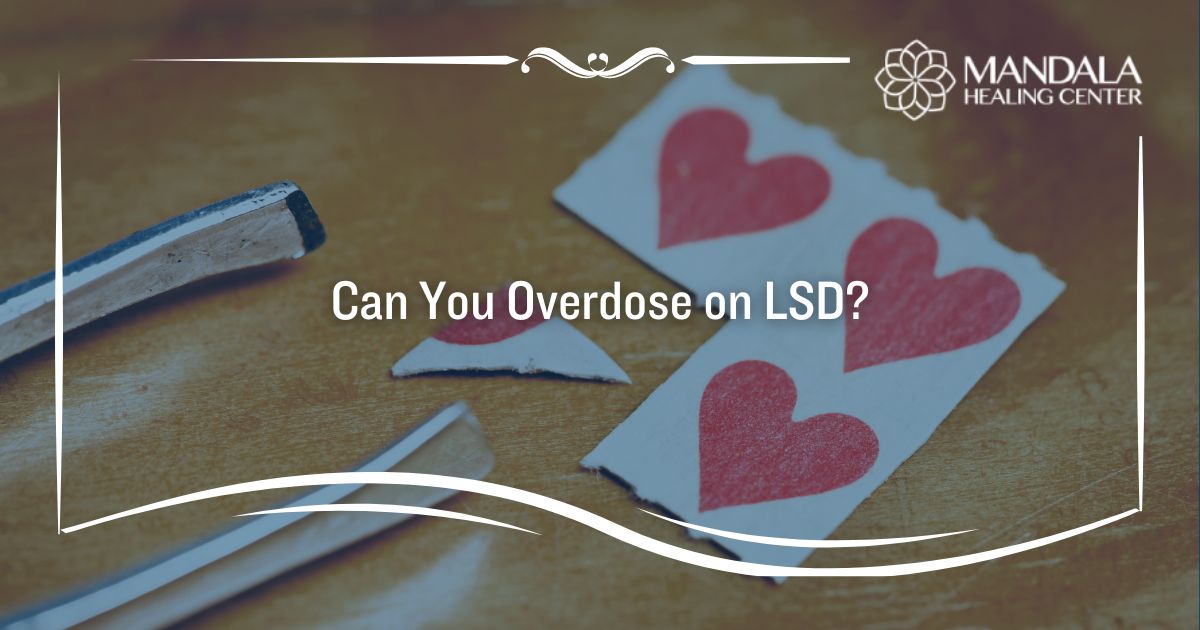D-lysergic acid diethylamide, most commonly known as LSD or “acid,” is an illicit hallucinogenic drug that alters users’ perceptions and thoughts. Many users experience pseudo-hallucinations, meaning they can hear or see things that don’t exist. Some users report developing synesthesias, a condition where one type of stimulation causes the sensation of another–such as hearing color.
Humans have used hallucinogenic substances for thousands of years as part of cultural rituals or practices. There are many natural hallucinogenic substances, including many plants and fungi. However, unlike natural hallucinogenics, LSD is a synthetic compound created in labs from a chemical derived from a fungus.
LSD use has many effects and risks for your health and well-being. Some may wonder if it’s possible to overdose on this potent hallucinogenic drug.
Overdosing on LSD isn’t likely to be life-threatening. However, some of the consequences can lead to dangerous behaviors or complications that cause lasting damage to your physical and emotional health.
Learn more about the dangers of using and overdosing on LSD and find treatment for substance abuse or addiction if needed. Contact the caring Mandala Healing Center staff to explore our comprehensive rehab programs or find support at any stage of your recovery journey.
Side Effects of LSD
LSD, which has the full name D-lysergic acid diethylamide, is known by several other names, including:
- Acid
- Dots
- Microdot
- Windowpane
- Yellow Sunshine
Users ingest LSD orally by tablet or liquid or by placing LSD-laced gelatin or paper under the tongue. Common LSD side effects include:
- Distorted sense of time
- Visual hallucinations
- Synesthesia–senses becoming “mixed up,” such as seeing sounds or hearing colors
- Heightened sense of smell or hearing
- A feeling of connection or “oneness” with the universe–a mystical or spiritual experience
- Sweating
- Nausea
- Dilated pupils
- Rapid heartbeat
- Dry mouth
- Tremors
- Insomnia
- Blurred vision
The effects of LSD can last up to 12 hours. The most substantial effects of an LSD “trip” typically occur within 2-5 hours of when a person ingests it.
LSD Overdose: Effects, Risk, and What to Do
Unlike heroin, alcohol, and many other substances, it is not possible to take enough LSD to be deadly. However, some people who use LSD will experience a “bad trip.” A bad trip can be very unpleasant or frightening.
While the physical aspects of an LSD overdose may not be life-threatening, people may experience changes in their thoughts and moods that lead to dangerous or deadly behaviors.
Effects
Some of the effects of an LSD overdose or bad trip include:
- Panic
- Extreme anxiety
- Paranoia
- The belief that they do not exist
- Aggressive behaviors
- Long-lasting psychotic features
- Rapid mood swings
Risks
People who have a bad trip on LSD may act in erratic, uncharacteristic, and dangerous ways. People may harm themselves or others without understanding what they are doing or put themselves in hazardous situations. A person having a bad trip may kill another person, mutilate their own body, commit suicide, or die by jumping off a building or running into traffic.
What to do if you overdose on LSD
A bad trip or LSD overdose is a dangerous situation. If you or someone around you is having a bad trip, you must seek emergency assistance. Call 911. Do not attempt to reason with the person or calm them down. Keep yourself safe by leaving the situation if you need to.
Risk Factors for LSD Overdose
There is no way to predict who will have an LSD overdose–or bad trip–and who will not. Even if someone has used LSD many times in the past without complications, it’s possible to have a bad experience.
People who habitually use LSD may develop tolerance to the drug, meaning that they need to take higher doses to get the desired effects. They may also build cross-tolerance to other hallucinogenic drugs like PCP. Developing tolerance to hallucinogens puts people at risk of having complications and bad trips as they require larger and larger doses over time.
Because of how it is weighed and the very low effective dose of this drug, it is nearly impossible to regulate the amount of LSD you take. People may unintentionally overdose on LSD, even if they have used it in the past, without problems.
Preventing LSD Overdose
Using LSD puts people at risk of a bad trip or overdose. If you use LSD or other intoxicating substances and can’t stop, you may need professional help in a substance abuse program. Comprehensive addiction treatment programs provide support and treatments, including:
- Behavioral therapies
- Group and family counseling
- Relapse prevention education
- Medications
- Mental health treatment
- Aftercare planning
Participating in a substance abuse treatment program allows people to identify the behavioral, emotional, and physical roots of their addiction and take steps toward a healthier, sober future.
Find LSD Addiction Treatment
If you or someone in your life uses LSD or other substances, reach out to the Mandala Healing Center staff to explore our holistic treatment programs. Our high-quality addiction treatment programs are designed to empower people as they work to put substance abuse behind them and embrace a new lifestyle in recovery. Call today to get started.












